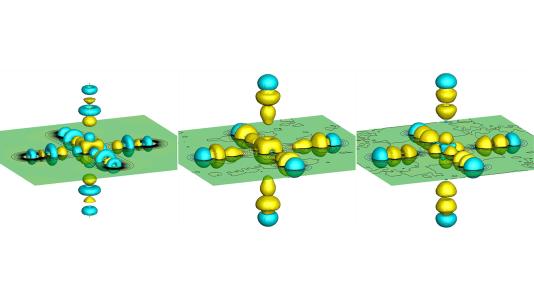
Scientific Achievement
Standard quantum chemical methods (CCSD(T)) often yield good agreement with standard DFT (B3LYP) calculations for spin energy differences, but both can be wrong. Quantum Monte Carlo (QMC) simulations show this for several small Fe complexes.
Significance and Impact
QMC also showed that a simple fix, density-corrected density functional theory, works and can then be used in much larger applications, such as spintronics.
Research Details
- We calculated energy differences between high-spin and low-spin states of [Fe(X)6]2+, where X is NCH, NH3, H2O, and CO
- We demonstrated that results from diffusion Monte Carlo methods were well converged; results from quantum chemical [CCSD(T)] and standard density functional methods gave poor results in comparison.
- Density-corrected density functional calculations using the Hartree-Fock density to calculate energies within density functional theory reduced the error in energy difference by up to a factor of three.
The Argonne Leadership Computing Facility provides supercomputing capabilities to the scientific and engineering community to advance fundamental discovery and understanding in a broad range of disciplines. Supported by the U.S. Department of Energy’s (DOE’s) Office of Science, Advanced Scientific Computing Research (ASCR) program, the ALCF is one of two DOE Leadership Computing Facilities in the nation dedicated to open science.
Argonne National Laboratory seeks solutions to pressing national problems in science and technology. The nation’s first national laboratory, Argonne conducts leading-edge basic and applied scientific research in virtually every scientific discipline. Argonne researchers work closely with researchers from hundreds of companies, universities, and federal, state and municipal agencies to help them solve their specific problems, advance America’s scientific leadership and prepare the nation for a better future. With employees from more than 60 nations, Argonne is managed by UChicago Argonne, LLC for the U.S. Department of Energy’s Office of Science.
The U.S. Department of Energy’s Office of Science is the single largest supporter of basic research in the physical sciences in the United States and is working to address some of the most pressing challenges of our time. For more information, visit https://energy.gov/science.